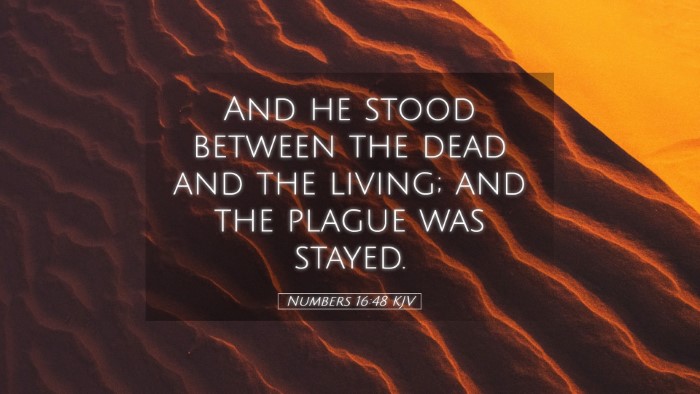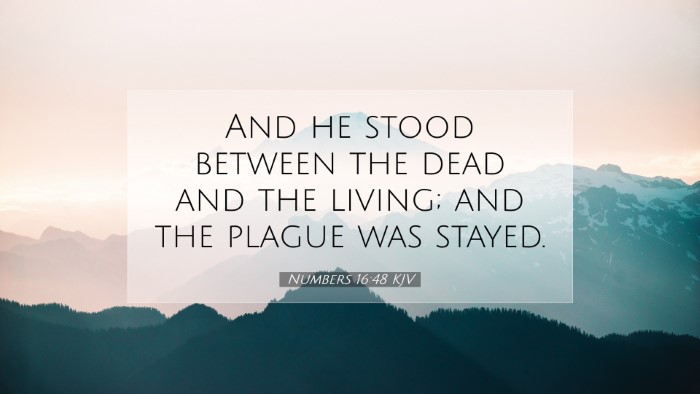Commentary on Numbers 16:48
Numbers 16:48 states: “And he stood between the dead and the living; and the plague was stayed.” This verse depicts a significant moment during a time of judgment against the Israelites who rebelled against God. Below is a synthesized commentary that draws insights from various public domain commentaries such as those by Matthew Henry, Albert Barnes, and Adam Clarke.
Contextual Background
The events leading to this verse are rooted in the rebellion of Korah, Dathan, and Abiram against Moses’ leadership (Numbers 16:1-3). God’s response was severe judgment, resulting in the death of those who opposed His appointed leaders. The context highlights the seriousness of rebellion against divine authority and the consequent wrath of God upon the nation of Israel.
The Role of Aaron
Aaron, the high priest, takes a pivotal role in this narrative. The verse emphasizes how he “stood between the dead and the living,” indicating his intercessory function. This action not only reflects Aaron's obedience but also his compassion towards the people he serves.
- Intercession: As highlighted by Matthew Henry, Aaron's act of standing symbolizes a plea for mercy. He embodies the role of mediator between God and the afflicted. His actions resonate with the themes of advocacy found throughout the Scriptures.
- Symbol of Christ: Adam Clarke draws parallels between Aaron’s mediation and the intercessory work of Christ. Just as Aaron acted to halt the destruction, Christ stands as our mediator, advocating for humanity before God (1 John 2:1).
The Plague and Divine Judgment
The plague mentioned in this passage is indicative of divine judgment upon sin. The rapid mortality among the Israelites serves as a stark reminder of God’s holiness and the grave consequences of disobedience.
- Judgment of Sin: Albert Barnes notes that the plague illustrates God’s immediate response to sin. The severity of this situation exemplifies how unrepentant behavior invites God’s judgment.
- Hope in Repentance: However, the cessation of the plague upon Aaron’s intercession offers hope. This illustrates that while judgment is just, mercy is also part of God’s character. It highlights the importance of repentance and the possibility of restoration.
Theological Implications
This passage carries profound theological implications for understanding God’s nature.
- Justice and Mercy: The balance of justice and mercy is crucial in this narrative. God’s justice is evident in His judgment, yet His mercy is equally manifested through the cessation of the plague initiated by Aaron’s intercession.
- Leadership Responsibility: This story serves as a caution for leaders to act with humility and responsibility, recognizing the weight of their role in guiding others. Leaders are called to intercede for their communities, especially in times of crisis.
Applications for Today
There are several ways that contemporary readers, pastors, and theologians can apply the lessons from Numbers 16:48:
- Intercessory Prayer: The role of intercession remains vital in the life of the church today. Believers are called to stand in the gap for their communities, much like Aaron did. This could involve prayer for healing, restoration, and divine guidance.
- Emphasizing Divine Authority: Understanding the weight of ministry and the seriousness of rebellion against divine authority encourages the faithful to honor God’s appointed leaders and to seek His will earnestly.
- Balancing Justice and Grace: The character of God as both just and merciful challenges believers to reflect on their own lives and their communities. Understanding God’s nature compels them to pursue holiness while extending grace to others.
Conclusion
In summary, Numbers 16:48 serves as a profound reminder of the importance of intercession, the seriousness of judgment, and the nature of God who is both just and merciful. It compels leaders and believers alike to embrace their responsibilities and to embody the spirit of mediation, reflecting Christ’s love and grace in a world often plagued by sin.


